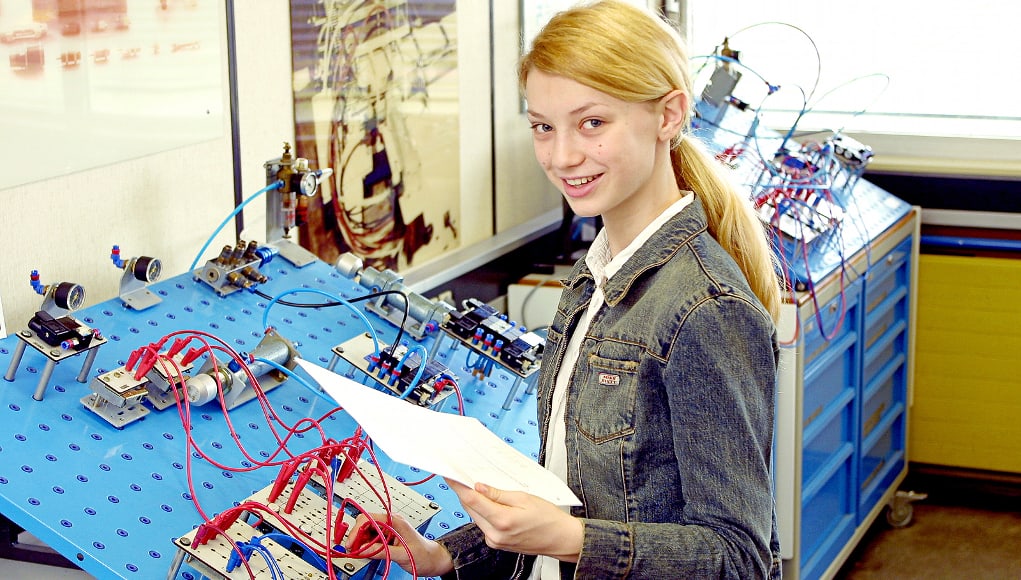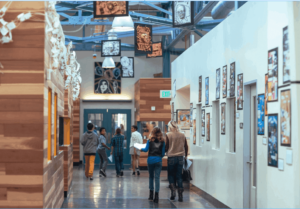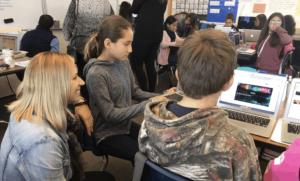How Does Project-Based Learning Prepare Generation Z for the Future?

By Breanna Reynolds and Nicholas Martino
Meet Generation Z– the future pioneers of our increasingly global world, a world that is “careening ahead at great velocity.” This post-millennial society will experience a future in flux where a growing polarization of labor opportunity will change the fundamental nature of work. As an ever-connected civilization in need of quick thinkers, problem-solvers and innovators for our future, it is imperative we consider how to best prepare this cohort for these radical shifts. Perhaps what distinguishes Generation Z from previous generations, in part, is the expanse of alternate and progressive forms of education available today; Project-based learning is a popular pedagogy known to prepare students for the challenges awaiting them in the real world.
More and more educators are recognizing project-based learning as a 21st century, future-focused methodology and research continually shows that PBL develops students who are more work ready than their standardized testing-focused counterparts. Having mastered skills even before stepping foot at a university, the competencies students gain through project-based learning, such as to adapt, fail, innovate and communicate, are highly sought after by modern employers.
So how do we best prepare students for a future unforeseen? At THINK Global School, similar to many future-forward schools, we continually strive to prepare students for a future in flux through self-directed learning. Here are four principles, with inherently future-forward skills, any project-based learner can model through experimental project-based studies.
1) Be Water
“Be water, my friend.” -Bruce Lee

Over forty years after his death, Bruce Lee’s life philosophies still represent the gold standard for anyone looking to live in harmony with the world. Like Bruce Lee, in believing no limitation as limitation, project-based learning teaches us to be adaptable and flexible to meet the needs of an ever-changing society. Shirley Tan from Business.com states that being adaptable gives any employer or organization a “new competitive advantage” for an “ever-changing workplace.” Even the United States Marine Corps unofficial motto is “Semper Gumby.” Adopted at a grassroots level, it references the official motto Semper Fidelis (Always Faithful), while invoking the built-in flexibility of that green clay character we all grew up loving. “Semper Gumby” declares that successful military personnel must adapt to changes in order to meet the demands of a world in flux. Likewise, PBL demands a level of flexibility and revision as setbacks are bound to materialize, as exemplified in the real world. It’s not the strongest nor most intelligent species that survive, claims Darwin, “it’s the one most adaptable to change.” Project-based learning teaches students to adapt to their surroundings and to be fluid and adaptable in ways that a standardized education simply can’t. Being able to overcome the challenges of projects lacking predetermined outcomes is an essential skill in today’s workforce.
2) Burn to Emerge
“The phoenix must burn to emerge.” -Janet Fitch

In referencing the mythological bird, author Janet Fitch depicts the phoenix as obtaining new life only by arising from the ashes of its predecessor. This symbolizes the importance of renewal after we’ve risked failure. As is true in PBL, failure allows us to grow in unimaginable ways, and a culture that celebrates failure is a culture that celebrates success. In failing during independent project-design, students are forced to be creative in their solutions to problems. Even Thomas A. Edison said, “I have not failed. I’ve just found 10,000 ways that won’t work.” For students who grew up receiving ribbons for anything and everything, accepting project failure will condition them to move on undaunted in search of their next possible solution. By design, students will adapt, change and begin again, in hopes of producing something authentic. “To become original,” states Adam M. Grant in his book Originals, “you have to try something new, which means accepting some measure of risk.” PBL students are trained to take risks and risk failure in order to achieve an original solution in the face of a common problem. And as our workplaces morph through progress and automation, the risk-takers will be the ones leading the way while the complacent are left behind.
3) Make Melodies
“There are not more than five musical notes, yet the combinations of these five give rise to more melodies than can ever be heard.” -Sun Tzu

Sun Tzu established the importance of creative thinking by taking seemingly simple notes and repurposing them to make melodies that appeal to the farthest reaches of the imagination. Project-based learning is similar in that it requires a process-and-systems approach to designing, timelining and problem-solving in order to invent solutions for our dynamic and ever-changing world. Design thinking allows for critical ingenuity during the project management phase, where students are encouraged to think outside the box in recognizing their project’s weaknesses and seeking new solutions. PBL students appreciate the gift of creative genius, and understand, as did Einstein, that cyclical thinking will only lead to cyclical problems — only authentic and innovative thinking will save the world. And in the workplace, those who are able to propose unique solutions to lingering problems are considered among the most valuable.
4) Tie Down Lions
“When spiders unite, they can tie down a lion.” -Ethiopian Proverb

This proverb suggests that there is power in unity, as does PBL philosophy. When learners are united in their effort, small contributions can make a huge difference in the community. Effective PBL requires negotiation, collaboration and feedback loops for success– in essence, it takes unity within the community to harness the power that discord can not. Active learning enhances our ability to recognize everyone as a teacher: professionals, experts, even fellow students across all ages, races, genders and ethnicities can become project mentors. In PBL, assessment is a community endeavor, and accepting kind, specific and honest criticism helps students hone their skills and develop high quality, solution-driven project work. Unity is essential in developing into an effective communicator for an increasingly complex world. It can’t be stressed enough how important communication skills are in today’s workforce and no pedagogy instills this skill in students like project-based learning.
Staring Down the Future
Bill Jensen, author of “Future Strong,” makes the bold prediction that 40% of today’s Fortune 500 companies will not exist in 10 years, reinforcing the notion that the future world of work will look very different than it does today. PBL advocates, such as Bonnie Lathram, Bob Lenz and Tom Vander Ark, stress the benefits of preparing students for an unpredictable, project-based world by having them learn through unpredictable, project-based simulations. This research proves that PBL is transformational when preparing students for the future they will soon inherit.
With rapid technological advancements and an age in flux fast approaching, students’ future plans will be disrupted and disrupted often. Fast Company editor Robert Safian suggests that we are approaching “an era where the most important skill is the ability to acquire new skills.” By staying fluid, reigniting after failure, crafting the most creative of melodies, and working together to tie down their lions, Generation Z looks perfectly poised to stare down all of the challenges that await them.
PBL allows for students to reinvent skill building for themselves, as they are the sole champion of their own intellectual pursuits. Our future depends on it.
For more, see:
- How Are We Training Today’s Students for the Growing Gig Economy of Tomorrow
- Preparing Students for Future Success with PBL and SEL
- Training Today’s Learners to be the Hired Guns of Tomorrow
- 5 Ways for Teachers to Nurture the Creative Genius in Their Students
Stay in-the-know with all things EdTech and innovations in learning by signing up to receive the weekly Smart Update.








0 Comments
Leave a Comment
Your email address will not be published. All fields are required.